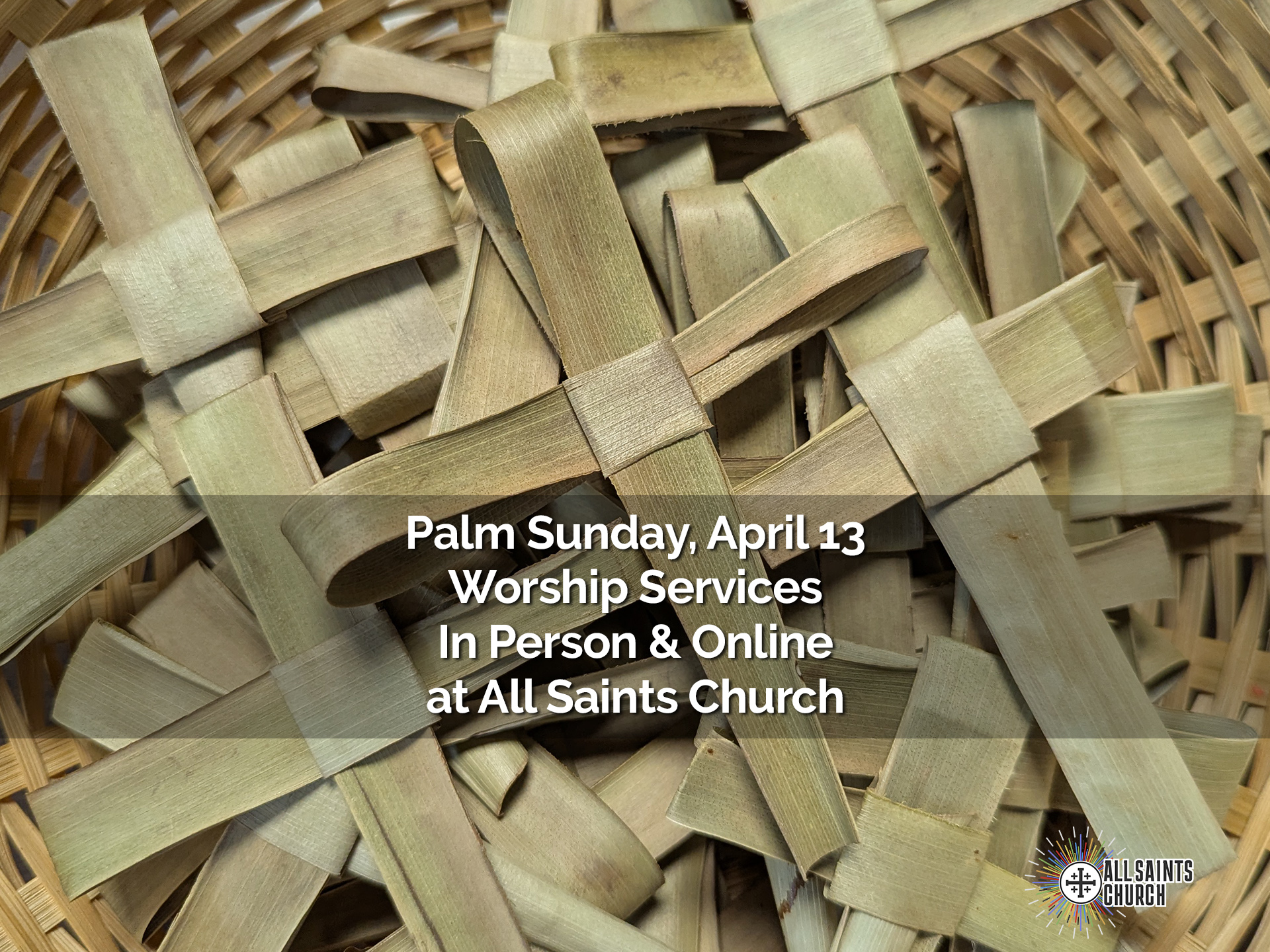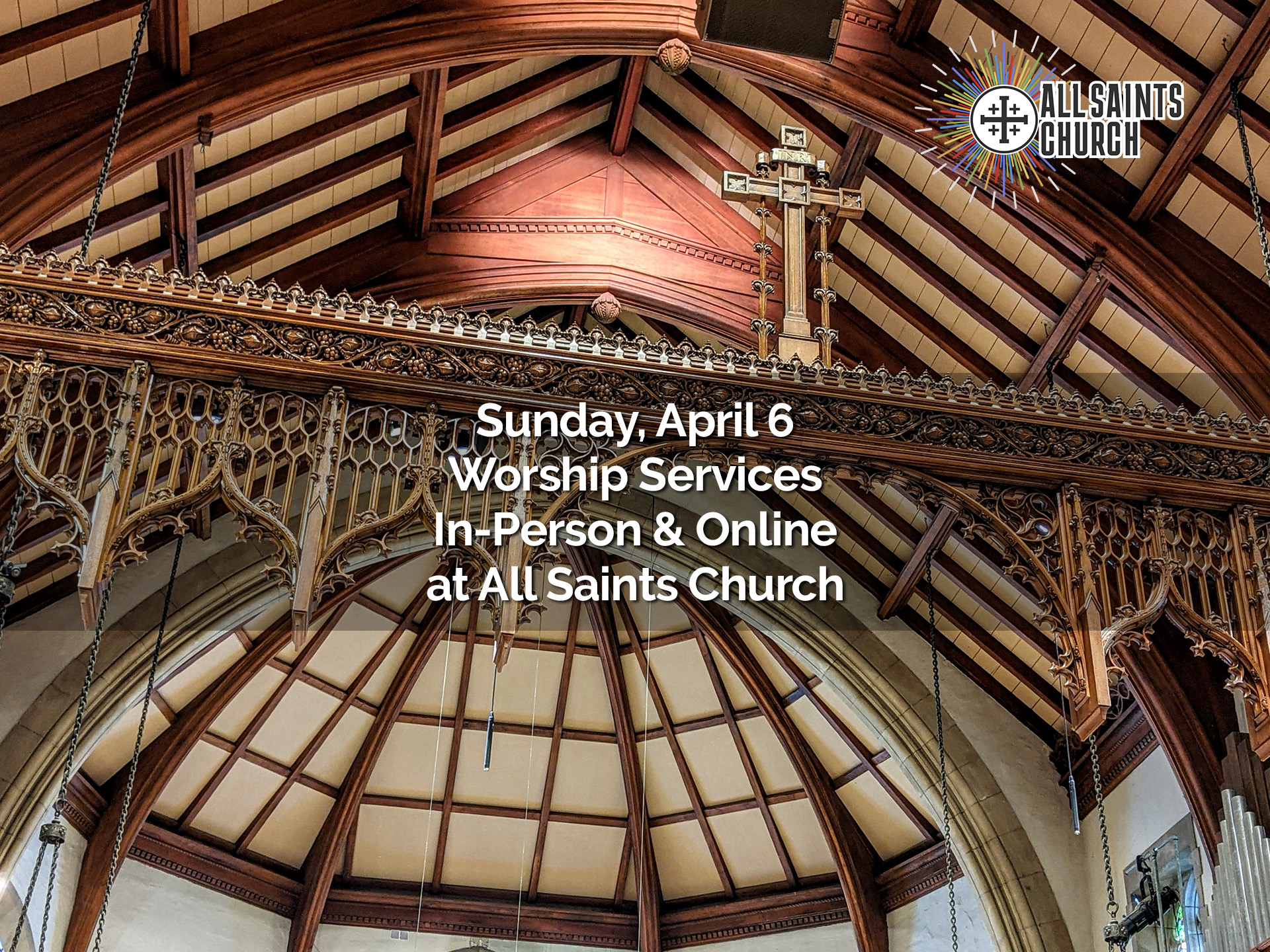Today’s Lenten Meditation is the text of the homily offered at Lenten Evensong on Sunday, March 25 at All Saints Church. Coventry Choir offered Bach’s Cantata No. 106 and Susan Russell offered “Who Tells Your Story?”
On Thursday we marked the half-way point
in this forty day journey to Easter we call Lent.
It is — for the record — a forty day count that doesn’t include Sundays.
That’s why they are Sundays “in” Lent rather than Sundays “of” Lent.
(File that under “Fun Facts to Know and Tell About the Liturgical Calendar”)
And so as we gather tonight for Lenten Evensong
we are slightly over half-way there.
But … wasn’t it just Ash Wednesday?
Didn’t we just gather in this place
to hear the familiar words of invitation to a Holy Lent
and receive the imposition of ashes on our foreheads
as outward and visible signs of the inward and inescapable reality
that we are dust and to dust we shall return?
“Time flies when you’re having Lent” doesn’t quite capture it —
but it does seem to me that this year
we have collectively been stuck in some kind of cosmic fast-forward mode
due in no small part to a non-stop news cycle
spinning from breaking news of one fresh disaster to the next.
And so I’m particularly grateful for this evening … in this moment …
to hit the pause button …
to gather in this “room where it happens” …
surrounded by light and beauty and music and each other …
to mark the half-way point in this forty day journey to Easter we call Lent.
This year — in response to the baptismal promise to “persevere in resisting evil” —
I framed my Lenten Discipline around the call to Sacred Resistance:
something the aforementioned news cycle
has “helpfully” provided no shortage of opportunities to exercise.
And my Lent 2017 soundtrack has been … Hamilton.
Perhaps you’ve heard of it.
It is the show that has captured the imagination of the nation:
the story of our Founding Fathers and Mothers
as they engaged in the two steps forward, one step back journey
of imagining a new nation — a new reality —
a new way of being in the world:
a retelling of the events that turned the world upside down
for the dream of life, liberty and the pursuit of happiness.
Hamilton has been the soundtrack for my Lent
in part because it’s brilliant musical theater
and in part because its narrative offers a powerful antidote
of hope and positive energy
in a world that seems to have been turned upside down
by polarization, demonization and the pursuit of profit.
I have listened to it in my car over and over and over again
in place of the endless stream of breaking news
and I am better for it.
And one of Hamilton’s refrains that has echoed in my head
during this first half of Lent is framed as a question:
Who lives, who dies, who tells your story?
Who tells your story? What frames your narrative?
Who — or what — has the power to make meaning
from the events, hours, days, months and years a life …
of a person or of a nation or of a faith?
In the end the Hamilton story
is the story of the deeply flawed founders of our nation in general
and Alexander Hamilton in particular
managing in — sometimes in spite of themselves —
to jettison the Divine Right of Kings
and create a new nation dedicated to the self-evident truth
that all men are created equal.
(And yes — for women we are still working on the sequel.)
And the Hamilton story also tells us
that they did it in the middle of chaos and uncertainty;
with the threat of tyranny on one side and anarchy on the other …
and an ongoing cycle of news of fresh disasters.
Nevertheless, they persisted.
And telling their story helps me — helps us — how to go and do likewise.
Meanwhile — in point/counterpoint to the Hamilton narrative this Lent —
the other stories that have informed my journey so far
are the scriptural stories appointed for our study and inspiration.
We’ve heard about Nicodemus —
the temple leader struggling to get past the literal words “born again”
in order to understand Jesus’ call to live life
aligned with the Spirit of love, justice and compassion.
We’ve heard about the Samaritan woman
who struggled to understand the difference between the literal water in the well
where she met Jesus
and the living water he told her he could give her that would change her life.
This morning we heard about the House Intelligence Committee …
I mean the Council of the Pharisees and Sadducees …
who struggled to understand how a man who was born blind could now see …
and who were intransigently unwilling
to receive any actual facts that ran counter
to the alternative fact they had already made their mind up about:
rejecting the idea that anything good could come from anything
that had anything to do with the Radical Rabbi from Nazareth.
Finally, this evening we hear Jesus warn the disciples:
“Keep your eyes open. Be on guard against the yeast
of the Pharisees and the yeast of Herod”
and we listen to them respond
“OMG … he’s saying that because we forgot the bread for the field trip.”
The very disciples who have been traveling with Jesus,
listening to his teachings,
witnessing the miracles he is working in the lives of those they encounter
are still so clueless that our Scriptures tell us Jesus reprimanded them saying
“Are your minds closed?
Have you ‘eyes that do not see and ears that do not hear’?
You saw me feed 5000 people and still you don’t understand?”
I don’t know about you, but I know that for me
that being reminded through these stories
that we come from a long line of spiritual ancestors
who didn’t always get what was going on right in front of them is comforting —
especially when I am struggling to figure it out for myself.
While there is a lot going on in all these stories
the one thing they have in common
is how commonly the Good News
of God’s transformative and abundant love is right in front of us
and we can’t see it.
Blinded by fears, prejudices, past experiences or internalized toxic narratives
it is far too easy to let someone else tell the story —
our story and God’s story —
and in the process lose the power to be agents of change.
To change the narrative.
To be instruments of God’s love, justice and compassion
n a news cycle dominated by fear, injustice and oppression.
And one of the things I’ve learned this Lent —
from Hamilton and from Jesus —
is that when we claim the power to tell our story — however we tell it —
we have the power to change not just our own lives but the lives of others.
And that brings me to Bach.
It is difficult to imagine a more tranquil, contemplative, hopeful and joyful testament of faith
than Bach’s Gottes Zeit.
As James Walker notes for us, Bach’s life was marked by tremendous loss.
Both his mother and father died before he was ten;
his first wife died at the age of 35 and he lost his brother the same year.
While blessed with many children who lived into adulthood,
he and his two wives lost ten children as newborns or young children.
In the midst of such loss, Bach’s fervent belief
in a just, wise and loving God remained steadfast.
The text of the cantata is illuminated
by the brilliant expressiveness and passion of Bach’s music.
Acknowledging our mortality and calling us to live life fully,
Bach leads us to the comfort, peace and joy of God’s gentle and loving hands —
trusting in the divine power that gives us victory over death.
Who lives, who dies, who tells your story?
The refrain from Hamilton illumines the story of Bach
who told his story through music that has inspired generations …
a story of life and death and — ultimately — trust in the love of God
greater than any challenge we face or tragedy we encounter.
The Lenten journey is half-way over.
As we continue forward to Easter and beyond,
may we refuse to be blinded
by fears, prejudices, past experiences or internalized toxic narratives.
May we claim the power to tell the story — our story and God’s story —
and in the process claim the power to be agents of change.
To change the narrative.
To be instruments of God’s love, justice and compassion
in the face of a news cycle dominated by fear, injustice and oppression —
trusting always in the divine power that gives us victory even over death. Amen.



